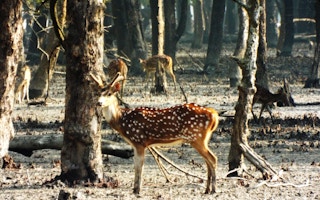Yet another coal-laden ship has capsized in the Sundarbans, the world’s largest mangrove forest.
On Saturday, “MV Sea Horse-1”, a cargo vessel carrying 1,235 metric tons of coal, sank in the Shela River in Sundarbans. The sunken vessel is currently lying at 30 to 40 feet below the surface of the water, and hasn’t been salvaged yet, media reports say.
The incident occurred near Tambulbunia, which is a critical habitat for the threatened Irrawaddy dolphin (Orcaella brevirostris) and the endangered Gangetic dolphin (Platanista gangetica), according to Abdullah Harun Chowdhury, a Professor at Khulna University in Bangaladesh.
Sundarbans, a UNESCO World Heritage Site, is also home to the endangered Bengal Tiger (Panthera tigris tigris), and several other threatened and rare species of fish, crabs, otter, crocodiles, birds and other wildlife. Capsizing ships severely threaten Sundarban’s unique ecology and wildlife, experts say.
In December 2014, for example, an oil tanker collided with a cargo vessel, spilling over 350,000 liters of Heavy Fuel Oil into the Shela River. Then, in May last year, a ship carrying 500 metric tons of fertilizer sank in Bhola River in the Sundarbans. A few months later in October, a coal-laden cargo vessel carrying 510 metric tons of coal sunk into the Passur River in the Sundarbans.
Following Saturday’s incident, the Bangladesh government has suspended other ships from plying the Shela River. Instead, the Shipping Ministry has asked all shipping vessels to use the Mongla-Ghashiakhali channel until further notice, according to local media reports.
However, similar bans in the past have been withdrawn quickly. For example, after the December oil spill, the government had banned cargo ships from plying the Shela River. But within a month, the ban was lifted and the route was re-opened.
Conservationists have repeatedly warned that permitting movement of cargo vessels through a sensitive region, such as the Sundarbans, poses a serious threat to Sundarbans’s wildlife and people.
Chowdhury’s team, for example, showed that the December oil spill has been catastrophic for the Sundarbans. Their investigation revealed that the oil has seeped into the forest floor, contaminated the waters and killed several animals such as otters, crocodiles, dolphins, fish, and frogs.
Coal, too, can be disastrous for the Sundarbans. According to Chowdhury, coal and coal waste products, including fly ash, contain heavy metals like arsenic, lead, mercury, nickel, vanadium, beryllium, barium, cadmium, chromium, selenium and, radium. When coal-carrying vessels sink, these heavy metals mix with the water, endangering aquatic life, he said.
“Mercury from coal is converted into methyl mercury, a toxic compound that harms people and others animals like crocodiles, dolphins, birds, fishing cat, and otter that consume contaminated fishes,” he said. “Population of the aquatic animals will decrease and long time impact on aquatic lives like loss of breeding capacity, habitat loss, injury of respiratory organs, hearts, eyes and skins will happen due these heavy metals.”
Heavy metals can also affect the growth and survival of major mangrove trees such as the Sundari tree (Heritiera fomes), Chowdhury said. Moreover, the mixing of coal, fly ash and fertilizer in the Sundarbans can also damage the spawning grounds of shrimp, he added.
The forest department has filed a case against the owner of MV Sea Horse-1 and five others, seeking nearly $640,000 in compensation. The department has also formed a four-member committee to investigate the sinking of the vessel.
Conservationists say that cargo ships carrying coal, oil, fertilizer and other chemicals simply add to the numerous threats that already plague the Sundarbans, such as deforestation, increasing salinity, natural disasters, poaching and illegal wildlife trade. Moreover, despite major backlash, Bangladesh is planning on a coal-fired power plant close to the Sundarbans.
To protect the Sundarbans, all kinds of chemicals and fly ash containing ships must be prohibited inside, Chowdhury said.
“Alternative river transportation routes must be launched from Mongla port to other parts of the country as soon as possible,” he added. “The rules and regulations of international conventions like Ramsar, UNESCO Natural Heritage Site, and the Convention of Biological Diversity must be implemented properly. A national political commitment is necessary to stop all kinds of activities which may create a problem for the fragile ecosystem of the Sundarbans.”
This story was published with permission from Mongabay.com.










